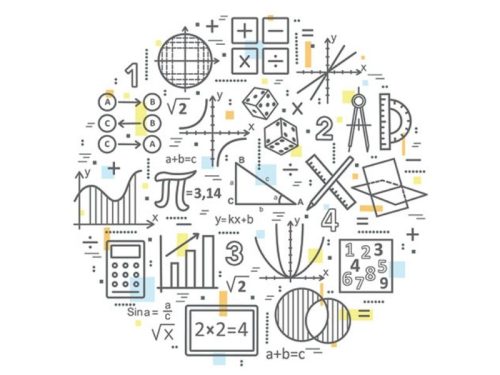No products in the cart.
The language of Mathematics
Every mathematical number or symbol has a corresponding word or phrase. Mathematics has a language of its own – Roopa Banerjee

Mathematics is associated with numbers and symbols. But, it’s also associated with intriguing words. Every mathematical number or symbol has a corresponding word or phrase. Math has a language of its own. The deeper we study the subject, the more likely we will come across words that are unique to this scientific discipline.
Most commonly used words in maths owe their origin to Old English. When the Romans conquered Britain, the local population spoke Celtic. The Romans brought Latin with them and later, other invaders brought their languages. Thus, developed the Anglo-Saxon language aka Old English. Number words such as one, two, three, four and measurement terms such as foot, yard, etc originate from Old English.
French words were introduced after the Norman conquest of England in 1066. Some French origin words include surface and surjection.
Most mathematical terms are of Latin origin. Arithmetic is derived from arithmetica. Interestingly, until the middle ages, most math words had an extra ‘r’ (eg. arithmetrika).
A large body of mathematical work was produced between 300 BC and 300 AD by Greek mathematicians Euclid and Archimedes among others. They gave us the Greek math words such as isosceles and convex.
Unlike other sciences where new jargon has to be approved by international organisations such as the International Union of Pure and Applied Chemistry (IUPAC), math words formation is left to individual initiative. Therefore the process of word formation in maths is often quite unpredictable. Moreover many specialised words associated with important concepts were not coined for years — mathematicians used the word radius for centuries before ‘diameter’ came into being. Addition and fraction were coined as early as 1100 AD while determinant came into existence as late as 1810.
Some familiar math words which are part of our daily usage today were heavily opposed when coined. For instance matrix and statistics received a lot of opposition as the origin of these words didn’t mean what they denote in mathematics. There is also an abundance of synonyms in this science — e.g modulus and absolute value, characteristic function and indicator function.
Many mathematical concepts such as the Abbe-Helmert Criterion and Zorn’s Lemma incorporate the names of people.
Did you know?
Algebra was coined by Persian scholar/astronomer Al-Khowarizmi in 825 AD. The origin Arabic word is al-jabr which means the reunion of broken parts, where a subtracted quantity on one side of an equation became an added quantity when moved to the other side.
Decimal is derived from the Latin decimus, meaning ‘tenth’.
Parabola was coined by Greek philosopher Apollonius, who had words for all three conic sections.
Plus or minus were used commonly by the Romans to indicate ‘more or less’.
Quiz
Guess the mathematical term that was derived from the origin as stated below:
1. A Greek word Circulus (meaning to hoop around or from a diminutive of the circular Roman circus).
2. Greek word Chorde (which means a piece of animal gut used as a string in a lyre).
3. Greek word Tri (which means 3) and the Latin word angulus (which means corner or angle).
4. Latin word Tangere (which means ‘to touch’).
5. Greek word dia (which means across) and metron (which means measure).
ANSWERS 1. Circle 2. Chord 3. Triangle 4. Tangent 5. Diameter
















Add comment